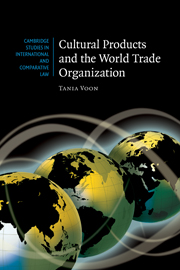Book contents
- Frontmatter
- Contents
- Detailed chapter outline
- Table of GATT/WTO agreements
- Table of GATT/WTO cases
- Table of abbreviations
- Foreword
- Acknowledgements
- Part I Stalemate and its ideological origins
- Part II Options for the future
- 4 Resolution through dispute settlement and international law
- 5 Constructing a new agreement outside the WTO
- 6 Improving the existing WTO agreements
- 7 Conclusion
- Bibliography
- Index
4 - Resolution through dispute settlement and international law
Published online by Cambridge University Press: 23 February 2010
- Frontmatter
- Contents
- Detailed chapter outline
- Table of GATT/WTO agreements
- Table of GATT/WTO cases
- Table of abbreviations
- Foreword
- Acknowledgements
- Part I Stalemate and its ideological origins
- Part II Options for the future
- 4 Resolution through dispute settlement and international law
- 5 Constructing a new agreement outside the WTO
- 6 Improving the existing WTO agreements
- 7 Conclusion
- Bibliography
- Index
Summary
Article 31(3)(c) of the Vienna Convention … mandates the consideration of non- WTO international legal rules in the interpretation of WTO treaties – rules that may reflect or prioritize other values and interests than those of trade liberalization …
Introduction
All laws involve some unsettled aspects, and ambiguity may even be deliberate, to accommodate the views of different individuals or groups involved in drafting. The drafters of the WTO agreements recognised that they could not anticipate every issue that might arise in future, revealing ambiguities in the text. Accordingly, one of the purposes of the WTO dispute settlement system is to clarify the meaning of the provisions and hence provide security and predictability in international trade. One possible solution to the difficulties with the current treatment of cultural products under WTO law is to leave the relevant provisions as they stand, while allowing the organs of WTO dispute settlement to resolve uncertainties where appropriate and, perhaps, to develop pragmatic compromises in the absence of explicit guidance in the text. Effectively, this is the approach that WTO Members have taken to this problemsince the WTO agreements came into force on 1 January 1995. Indeed, this is the way that WTO Members have dealt with most problems and ambiguities in the WTO agreements since the mid- 1990s. However, only one dispute on cultural products has proceeded to the stage of a Panel Report being circulated, namely Canada – Periodicals. The DSB adopted the Panel and Appellate Body Reports in that dispute on 30 July 1997. This leaves considerable scope for speculation about how other cultural policy measures would be assessed if challenged in future.
- Type
- Chapter
- Information
- Cultural Products and the World Trade Organization , pp. 123 - 172Publisher: Cambridge University PressPrint publication year: 2007



